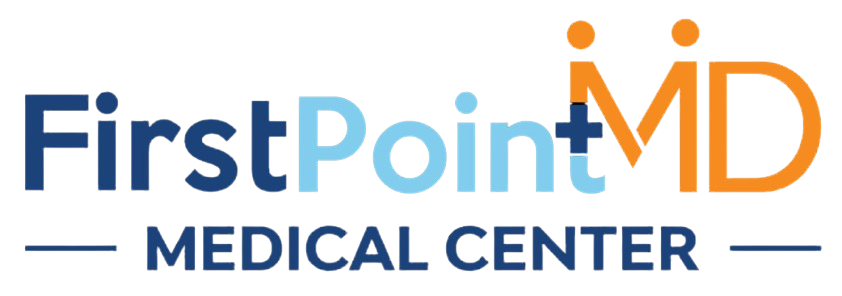Regular checkups with a primary care physician create a strong foundation for lifelong health and wellness. These medical professionals serve as the first line of defense against both acute illnesses and developing health concerns.
Primary care doctors detect early warning signs of chronic conditions like diabetes, heart disease, and hypertension through routine screenings and preventive care, allowing for early intervention when treatments are most effective. Their comprehensive knowledge of a patient’s health history enables them to spot concerning patterns and make informed treatment decisions.
At FirstPoint MD, primary care physicians build lasting relationships with patients while coordinating specialized care when needed. This personalized approach to healthcare helps patients maintain their wellbeing through every stage of life.
Understanding Primary Care
Primary care serves as the foundation of effective healthcare, providing comprehensive medical services and continuous patient relationships that lead to better health outcomes and reduced healthcare costs.
The Role of Primary Care Providers
Primary care providers (PCPs) act as the first point of contact in the healthcare system. These medical professionals include family physicians, internists, and nurse practitioners who coordinate patient care across multiple specialties.
PCPs develop long-term relationships with patients, maintaining detailed health histories and understanding family dynamics that impact health. They track vital signs, medications, and chronic conditions over time.
These healthcare professionals deliver preventive services like vaccinations, health screenings, and lifestyle counseling. They identify health risks early and create personalized treatment plans.
Components of Primary Care
Regular check-ups form the core of primary care, allowing providers to monitor health changes and address concerns promptly. These visits typically include physical examinations, vital sign measurements, and preventive screenings.
Primary care encompasses essential services:
- Acute illness treatment
- Chronic disease management
- Preventive care
- Health education
- Medication management
PCPs maintain detailed electronic health records and coordinate referrals to specialists when needed. They collaborate with laboratories, imaging centers, and other healthcare facilities to ensure comprehensive care delivery.
Access to primary care includes same-day appointments for urgent needs and telehealth options for remote consultations. Many practices offer extended hours and weekend availability to accommodate diverse schedules.
Managing Chronic Diseases
Effective chronic disease management requires a coordinated approach between healthcare providers and patients, combining medical supervision with lifestyle changes and consistent monitoring.
Challenges of Chronic Diseases
Chronic diseases like diabetes, heart disease, and hypertension demand constant attention and regular medical care. These conditions often progress slowly, making it difficult for patients to stay motivated with treatment plans.
Treatment adherence presents a significant challenge, with many patients struggling to maintain medication schedules and recommended lifestyle changes.
Medical costs can create financial strain, particularly for those requiring multiple medications or frequent doctor visits.
Primary Care Strategies
Regular check-ups with primary care physicians enable early detection of complications and timely treatment adjustments. FirstPoint MD offers comprehensive chronic disease management programs tailored to individual patient needs.
Remote monitoring tools help track vital signs and symptoms between visits, allowing doctors to make informed decisions about care.
Healthcare teams create personalized care plans that include:
- Medication management
- Regular health screenings
- Disease-specific education
- Care coordination with specialists
Lifestyle Modifications
Daily physical activity plays a crucial role in managing chronic conditions. Even moderate exercise for 30 minutes, five days per week, can improve health outcomes.
Dietary changes support disease management:
- Reducing sodium intake for hypertension
- Controlling carbohydrates for diabetes
- Limiting saturated fats for heart disease
Stress management techniques and adequate sleep contribute significantly to disease control. Support groups and counseling services help patients maintain long-term lifestyle changes.
Preventive Measures and Screenings
Early detection and prevention play vital roles in managing chronic diseases before they become severe health issues. Primary care providers offer essential screening services and preventive care that can identify risk factors early.
Regular Health Screenings
Blood pressure checks, cholesterol tests, and blood sugar screenings help detect cardiovascular disease and diabetes risks. Adults should have these basic screenings at least annually.
Cancer screenings vary by age and risk factors. Women aged 40+ need mammograms every 1-2 years. Adults 45+ should undergo regular colorectal cancer screening.
Body mass index (BMI) measurements and lifestyle assessments enable providers to recommend targeted interventions for weight management and physical activity.
Key Recommended Screenings by Age:
- 18-39: Blood pressure, cholesterol, diabetes
- 40-64: Above plus mammograms, colorectal screening
- 65+: Above plus bone density, hearing tests
Vaccinations and Immunizations
Vaccines prevent many chronic conditions and their complications. The annual flu shot reduces risks of respiratory problems and heart complications.
The CDC recommends specific immunizations throughout adulthood:
- Tdap (tetanus, diphtheria, pertussis) every 10 years
- Shingles vaccine for adults 50+
- Pneumococcal vaccines for adults 65+
Keeping vaccination records updated helps maintain long-term protection. Primary care providers track due dates and recommend appropriate boosters based on age and health status.
Frequently Asked Questions
Primary care physicians play a vital role in preventing and managing chronic diseases through screenings, lifestyle guidance, and ongoing monitoring. Expert medical recommendations help identify health risks early and implement effective preventive strategies.
What are the CDC’s preventive screening guidelines for adults?
The CDC recommends blood pressure checks at least every two years for adults with normal readings and more frequently for those with elevated numbers. Adults aged 45 and older should undergo diabetes screening every three years, while cholesterol screening begins at age 20. Cancer screenings vary by type, with colonoscopies starting at 45, mammograms at 40 for women, and cervical cancer screening at 21.
How do age and general health impact recommended preventive screenings?
Screening frequencies increase with age and existing health conditions. Adults over 65 need more frequent cardiovascular assessments and bone density scans. Those with chronic conditions or family health histories require customized screening schedules based on their risk factors.
Can you provide examples of preventive care measures for adults?
Preventive care encompasses annual physical exams, immunizations like flu shots and tetanus boosters, and dental cleanings every six months. Regular vision checks, mental health screenings, and lifestyle counseling form essential components of preventive healthcare.
How do primary care providers help manage chronic diseases?
Primary care providers create personalized treatment plans, monitor vital signs and symptoms, and adjust medications as needed. They coordinate with specialists, provide patient education about disease management, and schedule regular follow-up appointments to track progress and address concerns.
What preventative actions can reduce the risk of developing chronic illnesses?
Regular exercise, maintaining a healthy diet rich in fruits and vegetables, and getting adequate sleep support disease prevention. Limiting alcohol consumption, avoiding tobacco products, and managing stress through relaxation techniques help reduce chronic disease risks.
How does the IRS define preventive care for chronic conditions?
The IRS recognizes specific medical services that prevent chronic condition progression as qualified preventive care. These include regular blood sugar testing for diabetes, blood pressure monitoring for hypertension, and prescribed medications that help maintain stable health status in diagnosed conditions.


